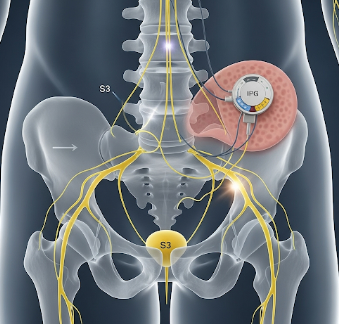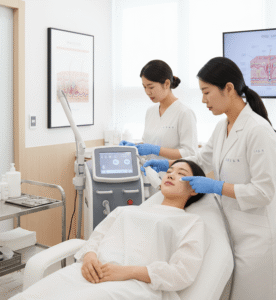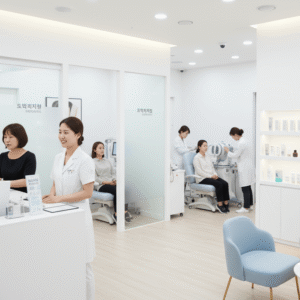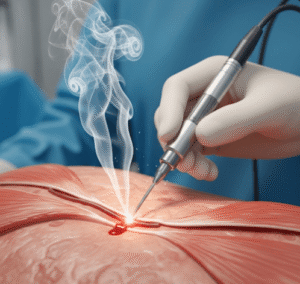Overview
Sacral Nerve Stimulation (SNS), also known as sacral neuromodulation, is a minimally invasive treatment that uses mild electrical impulses to stimulate the sacral nerves located near the lower spine. These nerves play a crucial role in controlling bladder, bowel, and pelvic floor functions. When these nerves do not function properly, patients may experience problems such as urinary incontinence, urinary retention, or fecal incontinence.
In Korea, sacral nerve stimulation is widely available in advanced hospitals and specialized urology or gastroenterology centers. With cutting-edge medical technology, highly trained surgeons, and modern follow-up care, Korea is becoming a top destination for international patients seeking this procedure.
What is Sacral Nerve Stimulation?
Sacral Nerve Stimulation is a therapy designed to restore proper communication between the brain and the sacral nerves. By implanting a small device (similar to a pacemaker), mild electrical pulses are sent to the sacral nerves to regulate bladder and bowel activity.
This procedure is usually recommended for patients who:
- Have urinary incontinence (loss of bladder control).
- Struggle with overactive bladder symptoms.
- Experience chronic urinary retention (inability to empty the bladder completely).
- Suffer from fecal incontinence (bowel leakage).
It is often considered when other treatments such as medications, lifestyle changes, or pelvic floor therapy have failed.
What are the Benefits?
Sacral Nerve Stimulation offers multiple benefits for patients struggling with bladder and bowel dysfunctions:
✅ Improved bladder control – reduces leakage and urgency.
✅ Better bowel control – decreases episodes of fecal incontinence.
✅ Minimally invasive – performed with a small incision and outpatient procedure.
✅ Reversible and adjustable – the device can be removed or adjusted if needed.
✅ Enhanced quality of life – restores confidence in daily activities.
✅ Drug-free management – reduces or eliminates the need for medications.
Procedure Details
1.How should I prepare for Sacral Nerve Stimulation?
Preparation involves several important steps:
- Medical evaluation: Your doctor will review your history, symptoms, and previous treatments.
- Pre-testing: In most cases, a trial stimulation (temporary device) is used to check if SNS will work for you before permanent implantation.
- Medication adjustment: Some medications may need to be paused before the procedure.
- Pre-op instructions: Patients are usually advised not to eat or drink for several hours before surgery.
- Counseling: Your healthcare team will explain risks, benefits, and what to expect after the procedure.
2.What happens during the procedure Sacral Nerve Stimulation?
The procedure is usually performed in two stages:
1. Test Phase (Temporary Trial):
- A thin wire (lead) is placed near the sacral nerve using a needle and guided by X-ray.
- The lead is connected to an external stimulator worn on a belt.
- Patients test the stimulation for 1–2 weeks to see if symptoms improve.
2. Permanent Implantation:
- If the test is successful, a permanent device (implantable pulse generator) is placed under the skin in the upper buttock.
- The stimulator is connected to the lead near the sacral nerve.
- The device settings can be adjusted externally using a programmer.
The surgery usually takes 1–2 hours and is performed under local anesthesia with sedation or general anesthesia.
3.What happens after a Sacral Nerve Stimulation?
After the procedure:
- Patients may feel mild discomfort around the implant site for a few days.
- Normal activities can usually be resumed within a week, but heavy lifting and strenuous exercise should be avoided for 4–6 weeks.
- The doctor will schedule follow-up visits to fine-tune the device settings.
- Patients are given a remote control to adjust stimulation levels within safe limits.
- In case of complications, adjustments or device replacement may be needed.
Risks / Benefits
Like all medical procedures, SNS has both potential benefits and risks.
Risks may include:
- Mild pain or swelling at the implant site.
- Infection requiring device removal.
- Lead movement (displacement).
- Uncomfortable stimulation or changes in sensation.
- Rare device malfunction.
However, the benefits usually outweigh the risks, especially for patients with severe incontinence that cannot be controlled by medications or behavioral therapies.
Recovery and Outlook
Most patients recover quickly after sacral nerve stimulation surgery.
🔹 Short-term outlook: Within the first few weeks, patients often notice significant improvements in bladder or bowel control.
🔹 Long-term outlook: Studies show that 70–80% of patients experience lasting relief for years with SNS.
🔹 Device life: The implanted generator usually lasts 5–10 years and can be replaced when needed.
With proper follow-up and device adjustments, SNS can provide long-lasting, life-changing improvements.
When To Call the Doctor
Patients should immediately contact their doctor if they experience:
- Signs of infection (fever, redness, swelling, pus at incision site).
- Sudden loss of bladder or bowel control.
- Pain that worsens instead of improving.
- Device malfunction (stimulation stops or becomes uncomfortable).
- Allergic reaction to implanted materials.
Early medical attention ensures quick correction and prevents complications.
Best Korea Option / Process
Korea is internationally recognized for advanced neuromodulation procedures like sacral nerve stimulation. Patients can expect:
- World-class hospitals in Seoul, Busan, and Daegu equipped with robotic and imaging technology.
- Specialized urology and colorectal centers with years of experience.
- Multilingual patient services for international visitors.
- Affordable treatment packages compared to the US and Europe.
- Comprehensive care, from diagnosis and trial stimulation to permanent implantation and follow-up.
Korean doctors also emphasize personalized programming of the stimulator, ensuring maximum comfort and effectiveness for each patient.
Highlights of Sacral Nerve Stimulation in Korea
- ✅ Effective treatment for urinary and bowel incontinence.
- ✅ Safe, minimally invasive, and reversible.
- ✅ Available at leading hospitals in Korea with advanced technology.
- ✅ Trial phase ensures effectiveness before permanent implant.
- ✅ Significant improvement in quality of life for 70–80% of patients.













